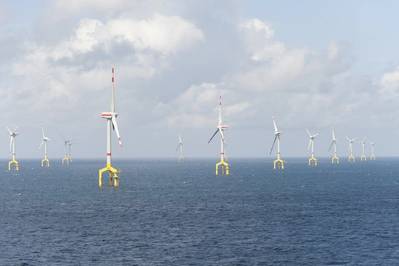German North Sea Wind Capacity Up 12.7%
Offshore wind power operators in the German North Sea raised generation capacity by 12.7 percent to 6,232 megawatts (MW) last year, nearing a government target of 6,500 MW national offshore capacity by 2020, grid company TenneT GmbH said on Thursday.
TenneT, the German arm of the bigger Dutch transmission network group, plays a key role in the sector because it is responsible for linking North Sea wind farms to onshore grids in the states of Lower Saxony and Schleswig Holstein.
Its German North Sea connection capacity already outstrips that of existing wind parks, having grown by 16.9 percent to 6,232 MW last year, as it anticipates the coming capacity additions, it said in a statement.
TenneT operates platforms and converter stations to turn direct current electricity from the offshore turbines into alternating current used in onshore power systems.
Once it brings a connection project for 900 MW, called BorWin 3, online in the course of 2019, it will have a total 7,123 MW capacity ready to transport wind power further south.
TenneT's investments are refinanced by grid fee income that is collected from power consumers as part of their bills.
But while capacity expansion is going ahead in the offshore industry, bottlenecks and delays arise in the construction of onshore power lines which are hampered by red tape and opposition from citizens.
New network projects on land must be accelerated to arrive at grid capacities "to transport the electricity to consumption-heavy regions of western and southern Germany as soon as possible," said TenneT GmbH's managing director Wilfried Breuer.
The Berlin government's offshore target, part of its renewable energy plan to move to a low carbon economy, also counts in more modestly sized plants in the Baltic Sea.
These are being connected to the onshore grids by TenneT peer 50Hertz.
TenneT data also showed that power production from North Sea wind farms last year increased by 4.9 percent to 16.75 terawatt hours (TWh).
This accounted for 15.7 percent of total German wind output, or 3 percent of total power production.
(Reporting by Vera Eckert, editing by Alexandra Hudson)



